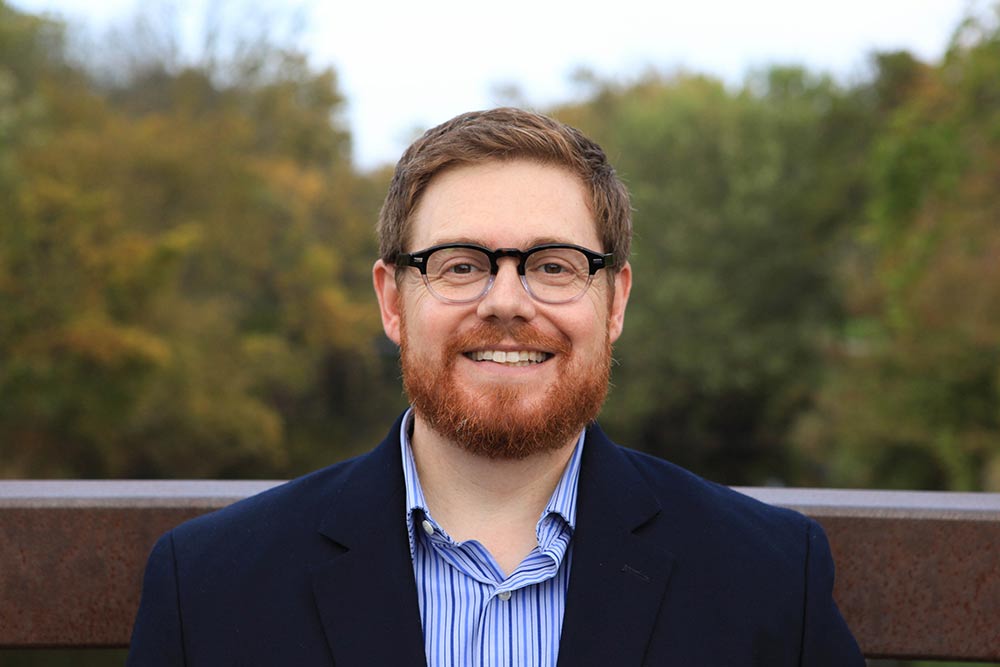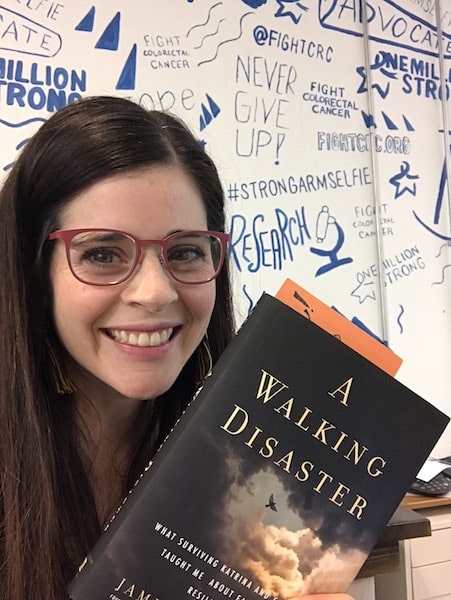Dr. Jamie Aten is a "Twitter friend" who I connected with first via social media. One day, his guest post about surviving stage 4 colon cancer hit my news feed and as I read it, I knew we needed to connect. Not only is his story inspirational, but his unique expertise in disaster psychology is extremely helpful - to all survivors. He's recently written a book and let me interview him for my blog! Enjoy reading and gleaning his insights!
To get inspiration and hope from a colon cancer survivor every Monday morning, subscribe now!

Q. Why did you write a book about surviving stage 4 colon cancer?
I wanted to help others going through cancer or those facing a personal hardship — especially those who are struggling and feel alone. I was diagnosed with stage 4 cancer at the age of 35. I had an incredible support system rally around me. But there were lots of times I felt like others didn’t quite get what it was like to receive this sort of news at such a young age or as a parent of three little daughters.
I also wrote this book to share spiritual and scientific insights to help others.
Most of the spiritual books I read made me feel like if I was struggling, it meant my faith wasn’t strong enough. It painted an unrealistic picture of what it looked like to face adversity. I wanted to be open with not just what I had learned, but also my shortcomings.
I was shocked by some of the things I read that were supposed to help me cope with cancer that just weren’t true. Throughout my book, I carefully share ways to cultivate resilience that are backed up by evidence in addition to my own experience — this was really important for me as a researcher.
Q. What was different about publishing research vs. publishing a memoir with your personal story?
Everything!
In good research writing, the goal is to write yourself out of the work. You try and keep personal experiences out of the paper and let the data speak for itself.
This was the exact opposite.
In my memoir, I let myself go back and re-experience each of the stories I tell all over again. I share with readers what I was feeling, thinking, seeing and hearing at the time.
Q. Which was the hardest chapter to write?
Chapter 4 - Crisis Communication 101: Honoring Your Whole Story.
In this chapter, I share how my wife and I sat down with our daughters to break the bad news, “Daddy has cancer.”
This was an incredibly difficult situation.
It’s still hard for me not to tear up just thinking about it. I remember feeling scared, angry, sad, anxious — pretty much all of the feelings — in that one moment.
Q. In chapter 2, you address "bad helpers." Any suggestions for survivors on how to respond to dumb comments they get?
Because I’ve spent my career studying disasters and mass traumas, I knew people were going to say things that weren’t helpful and potentially even hurtful when trying to help me.
Overall, I’ve found by in large most people mean well; their hearts are in the right place.
Unfortunately, most don’t know what to say or not to say.
When people feel overwhelmed with empathy or anxiety, they end up saying some really not so helpful things. At the same time, there's people who think they know exactly what you should do and the answer to not just your suffering but even cancer itself.
I don’t think there’s one way for survivors to respond when people say unhelpful comments.
Each of us has our own way of handling these sorts of situations.
For example, right after my diagnosis, I had a tech giving me a PET scan say, “God only tests the strong,” and, “At least you don’t have it as bad as I do.” In the moment, I couldn’t respond I was in so much shock by what she said. I could have gotten really angry.
Don’t get me wrong. I was upset and hurt. But then I thought to myself, “Well, now I know what to teach others not to say when bad things happen.”
I now use this example all around the globe in my disaster trainings I give. I dealt with it by trying to learn from the situation and redeem it for helping others.
Overall, from the research I’ve done on the topic, I found it helpful to try and give people the benefit of the doubt and forgive people when they make mistakes.
Otherwise, if we aren’t careful, it can start to eat us up inside.
At the same time, be authentic and set appropriate boundaries.
Q. In chapter 8, you talk about the benefit of "carving out calm in the chaos." What are some ways you've done that personally?
I moved into South Mississippi just 6 days before Hurricane Katrina struck my community for my first teaching job.
This is how I first got interested in doing disaster work and where I learned this lesson.
About a month after the storm, parts of our university reopened. I remember the college president saying, “Whatever you were doing before the storm, do now.” He went on to explain how this would help our students cope and have some sense of normalcy.
I applied this same lesson in my own life. As best as I could, I stayed active and did what was life giving. However, because of the cancer and my treatments, I soon found I couldn’t do the same things I had always done.
I carved out new ways to find calm.
I rarely left the house, but I still spent time with my wife and daughters at home. I rarely attended my faith community's gatherings, but I still prayed from my bed. I rarely worked, but every once in a while, I wrote a few paragraphs. I couldn’t go out and enjoy live music, but I listened to jazz and even watched the entire Ken Burns History of Jazz documentary at home.
When I had a good day, my family and I took advantage of it.
Q. How would you encourage other survivors who want to pray and have faith, but they're just not there yet?
Keep praying and talking with God. It’s okay to struggle, to be upset, to feel numb, or even angry at God.
This doesn’t mean you aren’t being faithful.
I recently shared in Margaret Feinberg’s blog about my spiritual surrender experience. I struggled with faith and fear throughout my entire cancer experience.
One morning, I was praying and quickly faced doubts. I remembered reading, regardless what I believed, that science shows prayer has been shown to improve well-being.
So I kept praying.
As I kept praying, eventually my doubt gave way to falling to my knees. My prayer shifted from asking God to make everything okay to trusting God with taking care of my wife and children even if I didn’t make it.
In that moment, I felt a deep sense of peace as I let go of what I couldn’t control over to God.
Q. What should survivors do if people keep their distance?
This is hard. Several people really close to me practically fell off the face of the Earth after I got diagnosed with cancer.
I remember questioning the authenticity of our friendship, and I felt hurt. I wondered why they pulled away.
Then, I was the one who pulled away.
My colleagues and I did a study after the first cases of Ebola were reported here in the United States. We wanted to know why there was such a seemingly high level of panic.
I mean, thousands of cases had been reported in Africa and most people stateside didn’t blink an eye. But after just a couple of cases in the U.S., fear was palpable. We ended up doing a massive study of people from all across the U.S. to see what we could learn.
We found support for what social psychologists refer to as terror management theory.
This is just a fancy way of saying that we go to great lengths to avoiding things that remind us of our own mortality as a way to manage our anxiety—including people.
A dear friend of mine was diagnosed with stage IV colon cancer right after I finished my treatments.
I didn’t realize at the time, but the worse he got, the more I pulled away because it brought up my own hurts and bad memories. It wasn’t until after he died from cancer that I realized what I had done.
It wasn’t because I didn’t care, but rather because I was scared.
Sometimes we need to extend grace not only to others—and in cases like mine—even to ourselves.
Q. How is your health today - as a stage 4 colon cancer survivor?
I feel incredibly grateful to share that I am just a few months shy of reaching 5 years with “no evidence of disease.”
I am thankful for every day I’ve had since being diagnosed with cancer and finishing a year of treatments.
Over the course of this time though I’ve come to learn that there is a difference between surviving and survivorship.
I used to think that if I could just get through my treatments, life would go back to normal. There has been so much good that has happened since then. But that doesn’t mean there haven’t been challenges.
Because of my complications since finishing treatments, I’ve changed my goal of getting back to normal to finding a new normal.
For example, I’ve learned to live with colostomy, manage fatigue, cope with intrusive traumatic thoughts, face permanent neuropathy in my fingers and feet, get hospitalized once or twice a year and undergo additional surgeries.
I’m just now starting to process my survivor’s guilt.
I don’t share these things as a way to say, "woe is me." I have it a lot better off than other people. And I’m incredibly thankful for every day. But, it doesn’t mean it’s not still hard.
I’ve found growth from suffering often doesn’t look like what most people expect.
Q. What is your advice to other survivors who want to write a book?
Start with knowing why you want to write the book. This will help you know if you are ready to start working on it and guide how you can help others.
When it comes to actually writing it, gather a support system around you that will listen and offer encouragement. Pace yourself by regularly checking-in with yourself to see how you are doing.
Set appropriate boundaries around what you need to share, or need to hold back.
In my book, I try to be as authentic as possible. I was also really vulnerable throughout the book.
But I only shared what I felt ready to share.
For example, I went back and forth about sharing about my colostomy. When I first started writing my book, I wasn't ready to do so.
By the end, with that added time, I was in a different place. And I included that story.
Q. What's your favorite baked good?
Blackberry Market’s cinnamon rolls.
Blackberry is a really cool café in Ellyn, Illinois owned by a local couple. I’ve had lots of great conversations there with friends and family over a hot cup of coffee and a cinnamon roll.

A stage 4 colon cancer survival story
I highly recommend reading Dr. Jamie's book, A Walking Disaster, which is full of inspiration and hope for anyone facing cancer, and especially stage 4.
He doesn't only share personal stories cancer survivors relate with, but he offers us a sense of sanity by showcasing how community and camaraderie can form even when suffering hits and hard times fall.
There's research, experts and other survivors out there who can help us along the way.

Danielle..thanks for your insights..I’m also a colon cancer patient..diagnosed at 71yrs young..so scared still..faith tested..why me..im now 72yrs and hoping to stay NED..please God…blessings to you.
Wow, that’s amazing. Congratulations on reaching NED & will pray with you that you stay there. God bless!